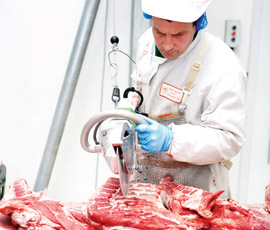‘Transparency needed in supply chain relationships’

If ever there was a year to test the strength and resolve of supply chain relations between food and farming companies, surely 2012 is the year, writes EFFP’s David Neal-Smith.
Whoever you talk to, whether farmers, processors or retailers, they all immediately shake their heads knowingly and start to rattle off stories about the pressures they face. Poor harvests, reduced sales, immense competition for consumer spend; everyone involved in the production, procurement or consumption of food is having a torrid time.
The recent decision by Vion to shut one factory and then pull out of UK meat processing altogether reflects an intense squeeze that is under way in the food processing sector. Processors such as Vion find themselves in a precarious situation; they are not unique, note also the recent closing of two of Premier Foods’ bakeries.
Faced with limited, if any, volume growth in retail sales, combined with increases in commodity prices, it’s a tricky year. This combined with moves to increase processing productivity, mean that overcapacity has, at some stage, to be rationalised.
This is a painful, although in many cases necessary, process but one which should not go so far as to cut into the productive capacity that will be needed over the longer term.
As the processing sector rationalises, so does the customer base for farmers and this may give impetus to further development of supply chain relationships. Processors play a critical role in any well-performing supply chain, linking farmers to retailers and ultimately to consumers. They also fulfil a co-ordination role, for example managing the growing number of retailer “producer groups” and organising supply from the many and remote farms which can be a difficult and resource intensive process.
This year, supply chains are being tested. More than ever, businesses appear to be blaming each other for their own precarious predicament. In the case of Vion, how much a deterioration in supply chain relations contributed to its decision is unknown, but this was probably a factor.
The uncertainty arising from the decision to close Hall’s of Broxburn will have left pig producers uneasy and no doubt acted as a catalyst for them to seek alternative routes to market.
“This year, supply chains are being tested. More than ever, businesses appear to be blaming each other for their own precarious predicament. In the case of Vion, how much a deterioration in supply chain relations contributed to its decision is unknown, but this was probably a factor.”
For supply chains to perform well, there must be close alignment between farm production and processing.
Integrated farming and processing businesses are more common outside the UK and the shared ownership by farmers of processing capability has inherent transparency. For example in Denmark, Arla both procures and processes milk but its farmer ownership creates a closer link between these two important functions and can smooth margins between both. The recent merger with Milk Link must be a very good thing.
In the UK the integrated model is less prevalent and businesses have favoured more of a partnership approach. Behind the more high profile examples such as Waitrose, with their dedicated supplier groups, there are a number of partnerships in development that are starting to reap similar benefits.
However, a successful supply partnership requires even greater trust than the more integrated ownership model because the partnership approach is not bound by the formal structures and agreements of common ownership.
Therefore all parties in the chain must be prepared to be open and develop an understanding of the respective activities, in particular the economic pressures each faces. True transparency is a vital component and to develop trust all parties, not just farmers, must be willing to share relevant information on costs and margins. When things are going well this is not so difficult, it is the challenges presented by an extreme set of circumstances, such as we have now, which create major tensions.
A supply chain partnership can fall at the first hurdle as farmers and processors set out to decide on the parameters of price each year. Early in the relationship it is difficult to give something up in the hope that long term benefits to all parties make this worthwhile.
If a processor has to pay more for, say, pigmeat on a cost of production basis it could initially have a negative impact on profitability, which is difficult to stomach. Likewise if farmers agree to a cost of production basis for wheat or potatoes it may result in lower price and profit in the early years.
However, for some, the benefits of stability over a long period are increasingly being seen to outweigh the foregoing of short term gain.
EFFP is an agri-food consultancy, specialising in the development of supply chain partnerships between farmers and food companies.
Keep up with the latest agricultural business news
